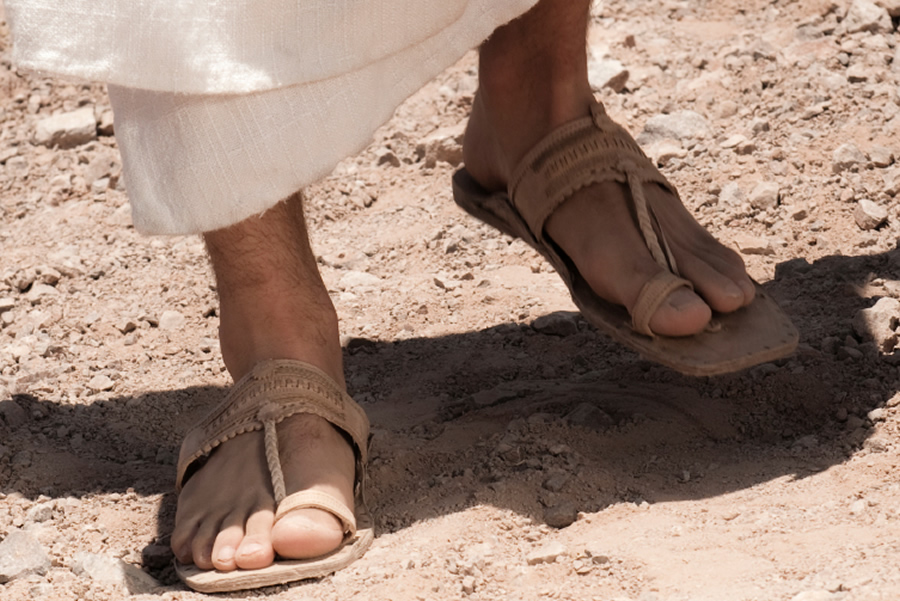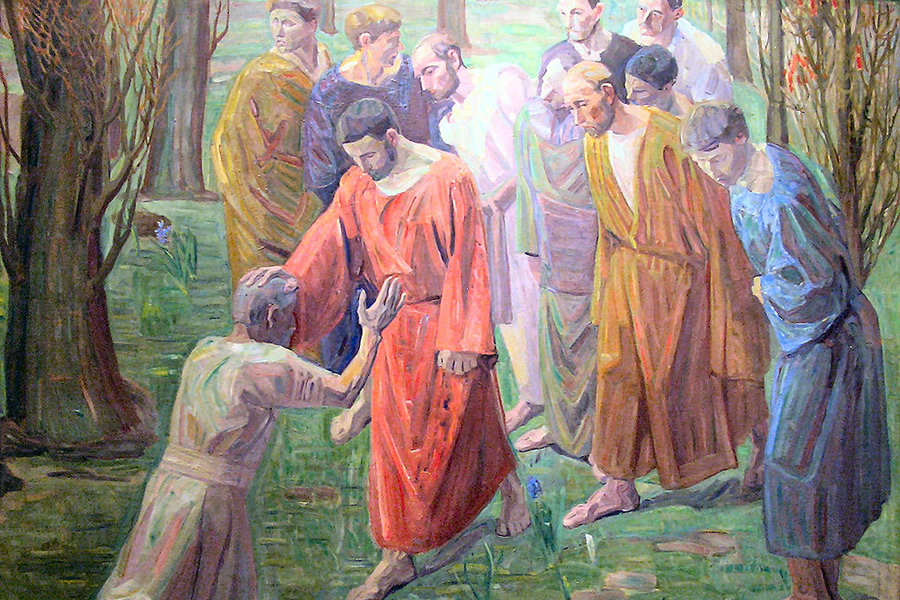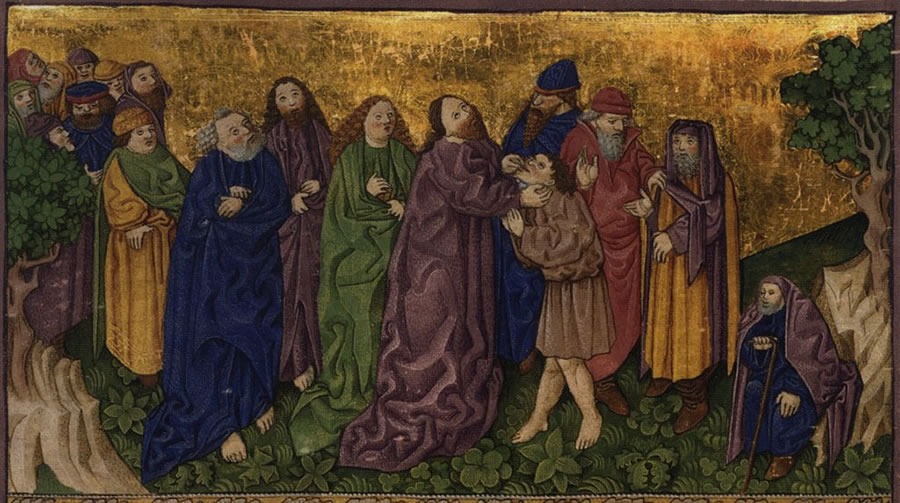St. Francis of Assisi Weekly Reflections

You Say I am a King
11-25-2018Weekly ReflectionWe Celebrate Worship Resource, Vol. 43, No. 3Normally when we hear this selection from John’s Gospel it’s on Good Friday in the lengthy account of the Passion of Our Lord. When just these few verses are excerpted—featuring Pilate’s initial questioning of Jesus—we really get a sense of how obsessed Pilate is with the possibility that Jesus is a king. It is a tendency among political leaders, no matter the size of their “kingdom,” to put their highest priority on retaining their power. Jesus was said to be a king and so Pilate saw him as a potential threat to his power. But Pilate misunderstood. As Jesus tells Pilate, he did not come to seize power. He came instead to testify to the truth. This is what distinguishes God’s kingdom from any kingdom of this world. It is not obsessed with power. It does not need to be. “His dominion is an everlasting dominion,” we hear in the first reading (Daniel 7:14). “I am the Alpha and the Omega,” the beginning and the end and everything in between (Revelation 1:8). Every kingdom of this world is temporary; God’s kingdom is eternal.
How can you build God’s kingdom without grasping for power over others?
READ MORE
Share Christ's Light with the World
11-18-2018Weekly ReflectionWe Celebrate Worship Resource, Vol. 43, No. 3The images that begin today’s Gospel are dramatic and frightening: “the sun will be darkened...the stars will be falling from the sky...the powers in the heavens will be shaken” (Mark 13:24 -25). They echo what we hear from Daniel in the first reading, of “a time unsurpassed in distress” (Daniel 12:1). Many times we may have felt the same way about the world today. Wars, genocide, natural disasters, mass shooting, rising sea levels—sometimes it feels as though the end of the world is right around the corner. But in between the scary images in today’s readings and the warning that no one knows the day or the hour, there is a note of reassurance. The Son of Man will come in power and glory, overcoming the darkness, overcoming evil. Whatever horrible things may be happening in the world, Christ our Light is stronger. Jesus Christ, both priest and victim, “offered one sacrifice for sins,“ transcending space and time, conquering sins everywhere and anytime, past, present and future (Hebrews 10:12). We live with the assurance of God’s only Son coming again in glory, for the reign of God will have no end.
How can you bring the light of Christ to the world today?
READ MORE
He Gives His Very Life to Save Humankind
11-11-2018Weekly ReflectionWe Celebrate Worship Resource, Vol. 43, No. 3The readings today provide us with two models of faith and generosity. The widow in the first reading is in dire straits. She and her son have no food but a handful of flour and a little oil. “When we have eaten it, we shall die,” she tells Elijah heartbreakingly (1 Kings 17:12). Yet she will share the last of what she has with this stranger who makes promises on behalf of his foreign god. Elijah has such strong faith in the Lord that he promises this pagan woman that God would make sure that she would not run out of food. The widow’s generosity, sharing the very last of what is keeping her alive, is rewarded. In the Gospel, Jesus lauds the same kind of generosity. Another unnamed widow takes center stage. She gives “all she had, her whole livelihood” to the temple, to the Lord (Mark 12:44). Her faith and generosity are lauded. But the ultimate model of faith and generosity is Jesus. He is faithful to his Father’s will. He gives his very life to save humankind. As we hear in the second reading, “Once for all he has...take(n) away sin by his sacrifice” (Hebrews 9:26).
How are you a model of faith and generosity to others?
READ MORE
You Shall Love Your Neighbor As Yourself
11-04-2018Weekly ReflectionWe Celebrate Worship Resource, Vol. 43, No. 3Today Mark invites us to put ourselves in the shoes of the scribe who asks Jesus, “Which is the first of all the commandments?” (Mark 12:28). As the commandments are instructions of how a faithful person should act, the scribe was basically asking Jesus what one principle above all should guide his actions. Unlike most religious authorities who came to Jesus with questions, he was not trying to trick him or test him or find something that could be used against him. One can tell from the way he responded to Jesus’ answer that he sincerely wanted to know which of the 613 precepts of the Jewish law was paramount. Jesus responds by quoting the passage from Deuteronomy that we hear in the first reading, “You shall love the Lord your God,” as well as Leviticus, “you shall love your neighbor as yourself” (Mark 12;30, 31). It was not enough to state just the first. The scribe wanted just one, but he got two. A few days ago we celebrated the Solemnity of All Saints, recognizing those who put their faith into action, living lives that serve as models for us. Today we are the scribe, being told by Jesus the way to act, the way to live.
How do you put your love of God and neighbor into action?
READ MORE
How Is God Calling You?
10-28-2018Weekly ReflectionWe Celebrate Worship Resource, Vol. 43, No. 3Mark does something very clever in the Gospel we hear today: he disguises the story of a call as a healing story. Bartimaeus is cured of his blindness, to be sure, but the story has much more to offer. The clues are there. “Jesus is calling you,” the crowd tells Bartimaeus (Mark 10:49). “He threw aside his cloak,” leaving not only the money he collected, but also his former way of life (10:50). “Master, I want to see,” he says, addressing Jesus as one whose orders he is willing to follow (10:51). “Go your way; your faith has saved you,” Jesus responds, but ironically, Bartimaeus does not go his own way (10:52). “Immediately he received his sight and followed him on the way” (10:52). Bartimaeus has chosen to follow Jesus. He may have been physically blind, but he had eyes of faith the whole time. God’s call permeates the other reading as well. Both Jeremiah and the Psalmist praise Godscall to those who had left in tears, now returning rejoicing. In Hebrews, every high priest, most notably Christ, is calledby God. This is what we are all asked to do: with eyes of faith, to follow God’s call.
How is God calling you?
READ MORE
Whoever Would Be Great Among You Must Be Your Servant
10-21-2018Weekly ReflectionWe Celebrate Worship Resource, Vol. 43, No. 3Once again, Jesus challenges his disciples to change their perspective. He had just told them—for the third time—that he would soon be put to death. In Mark’s Gospel, James and John immediately make a request to have special places in God’s kingdom when Jesus rises in glory. How inappropriate! Jesus tries to make them understand how difficult his mission is, then goes on to give a lesson on true leadership: “Whoever wishes to be great among you will be your servant” (Mark 10:43). Whereas world leaders lord their authority over others, Jesus announces, “The Son of Man did not come to be served but to serve and to give his life as a ransom for many” (Mark 10:45). The author of the passage of Isaiah we hear today also tried to change the perspective of his audience. The Israelites had been defeated and sent into exile. Truly their lives were difficult, but Isaiah finds this suffering to be redemptive; “through his suffering, my servant shall justify many” (Isaiah 53:11). Though “tested” in every way (Hebrews 4:15), both Jesus and Isaiah were willing to sacrifice themselves on behalf of others.
What sacrifice are you willing to make in order that others may benefit?
READ MORE
All Things Are Possible for God
10-14-2018Weekly ReflectionWe Celebrate Worship Resource, Vol. 43, No. 3Wouldn’t it be great to find the secret to success? To find a formula that would enable you to have fame and fortune, power and respect, good health and great wealth? Solomon, however, preferred the spirit of wisdom instead, extolling it over all these worldly goods. By the “spirit of wisdom” (Wisdom 7:7) he meant the insight that comes from true understanding, the insight that expresses itself in sound judgment. Indeed, with this gift from God, Solomon gained the worldly goods that in that era indicated that he was blessed by God. But Jesus gives us pause. In the Gospel, Jesus shatters a rich man’s hopes telling him that in order to inherit eternal life he needs to sell all he has, give it to the poor, and follow him. This is too much! The word of God, “sharper than any two-edged sword,” leaves him disconsolate (Hebrews 4:12). But then Jesus gives his disciples the secret: “For human beings it is impossible, but not for God. All things are possible for God” (Mark 10:27). This is the insight Solomon had. All his worldly gains were actually blessings from God. God alone has the power to bless us with those things that have permanence, with those things that will last.
How can you distinguish between those things that are transitory and those that have permanence?
READ MORE
Let the children come to me, the Kingdom of God belongs to such as these
10-07-2018Weekly ReflectionWe Celebrate Worship Resource, Vol. 43, No. 3Today’s readings allow us to marvel at God’s creation, but also afford us the chance to give thanks that we are all able to participate in it. God’s creation is not solely that long-ago formation of the world. The world continues to be created, specifically we see today, through marriage. Jesus repeats the words of Genesis: “the two shall become one flesh” (Mark 10:8). It is the married partners who co-create this “one flesh,” this unique new entity. From the beginning, in fact, humans participated in the creative event. In the first reading, the man names all the animals that God creates. Later, in order to make a suitable partner for the man, God removes a rib from man in order to create a woman. However, as much as we participate in God’s creative work, Jesus teaches us that it is little children—innocent, powerless, and dependent on adults—who model the way to the kingdom of God. All creation ultimately comes from God, and that includes God’s kingdom. Those who recognize God’s kingdom as a gift and receive it as a child would receive a gift as shown to be worthy of entering it.
How are you to accept God’s gifts as a child would, with wonder and delight?
READ MORE
Whoever is not against us is for us
09-30-2018Weekly ReflectionWe Celebrate Worship Resource, Vol. 43, No. 3Half of what we hear today is comforting, but the other half is sobering. In the first reading the spirit of the Lord is bestowed upon the elders, enabling them to prophesy, to speak in the Lord’s name. Joshua objects, but Moses disagrees, going so far to say, “Would that all the people of the Lord were prophets!” (Numbers 11:29). The first half of the Gospel echoes this tolerance: “Whoever is not against us is for us” (Mark 9:40). Neither Jesus nor Moses wish to limit God’s power. On the other hand, in both the second reading and the second half of the Gospel, we hear the terrible consequences that will befall those who are “against God.” Those who value their riches over the welfare of others, Saint James writes, will rot and corrode just like their clothes, jewelry, and money will. This echoes what Jesus told his disciples: whatever causes you to sin would be better cut off before it ruins you. Though the grace of God is spread across the earth, available to all who accept it, those who throw up obstacles to this grace, who selfishly diminish the lives of others, will be judged harshly.
What part of yourself to do you need to cut off, do you need to remove?
READ MORE
Servant of All
09-23-2018Weekly ReflectionWe Celebrate Worship Resource, Vol. 43, No. 3Mark does not paint a pretty picture of the disciples. While Jesus is telling them that soon he would be put to death, they are busy arguing about who is the greatest. Surely they realize how terrible this was, as none of them will admit this to Jesus. Nevertheless, Jesus addresses their behavior, instructing them using the example of a child, one who is dependent on others for care. “Whoever receives one child such as this in the my name, receives me; and whoever receives me, receives not me but the One who sent me” (Mark 9:37). The lesson is clear; put aside your selfish ambition and care for the least of all. This is the kind of thinking that “the wicked” in the first reading utterly reject. Their selfishness inspires them to torture and kill “the just one,” foreshadowing the passion and death of the Lord. James addresses this jealousy and selfishness in his letter. When we are self-centered, we act as though we are the center of the universe, inevitably leading to conflict. When we exercise true wisdom, we acknowledge that we are just a speck in the universe. We make ourselves “the last of all and the servant of all” (Mark 9:35). It is in giving ourselves to the least among us that we receive more than we could ever possess on our own, that we receive God.
What can you do to put others before yourself?
READ MORE
Deny Yourself, Take up Your Cross and Follow Me
09-16-2018Weekly ReflectionWe Celebrate Worship Resource, Vol. 43, No. 3It is not easy to be Christian. That is, it is difficult to be a true Christian. Isaiah gives us a foretaste of this when he writes: “I give my back to those who beat me, my cheeks to those who plucked my beard” (Isaiah 50:6). Isaiah suffers as Christ would, and like Christ he suffers willingly. For God’s sake, he stands up to those who oppose him without fighting back. James does not speak of suffering, but he tells us that faith demands action. “Faith of itself, if it does not have works, is dead” (James 2:17). Dead. It is not enough just to believe. If our neighbor is in need and we do not respond, what good is our faith? The Gospel puts it all together. Jesus tells his disciples what it means to be a Christian. After telling them that he must suffer, die, and rise on the third day, he rebukes a protesting Peter: “Get behind me, Satan. You are thinking not as God does, but as human beings do” (Mark 8:33). Then he addresses his disciples and the assembled crowd, “Whoever wishes to come after me must deny himself, take up his cross, and follow me” (Mark 8:34).This, then, is what we need to do. This is what our faith demands.
How can you deny yourself in order to live as true Christian?
READ MORE
The Healing of a Deaf Man
09-09-2018Weekly ReflectionWe Celebrate Worship Resource, Vol. 43, No. 3Our god is a transformative God. In the readings today we hear God transform our neighbor, our thinking, or our world in a radical way. Isaiah prophesies about the transformations the Lord will bring: the blind will see, the deaf will hear, the lame will walk, and the mute will sing. The land will be transformed as well, with life-giving water flowing in barren lands. Saint James describes how God transforms our thinking. Judging others based on appearance or wealth is wrong, and in fact unchristian, as Christ repeatedly favored those who were poor in the eyes of the world. We encounter one of those people in the Gospel. Mark does not even note his name, but he is deaf and has a speech impediment. He is not even able to address Jesus. Nevertheless, asked by the crowd, Jesus heals the man. Mark gives us an idea of how much effort Jesus put into it, describing the process in detail and specifying that Jesus “groaned” when looking up to heaven. The crowd, though instructed to keep silent, cannot help but proclaim, “He makes the deaf hear and the mute speak,” invoking the words of Isaiah (Mark 7:37). Jesus has transformed the life of the deaf man as well as the lives of all who witnessed healing.
How has God transformed you life?
READ MORE
Be Doers of the Word
09-02-2018Weekly ReflectionWe Celebrate Worship Resource, Vol. 43, No. 3Actions speak louder than words. From Moses to Saint James to Jesus in Saint Mark's Gospel, it's unanimous: it's not what you say that God values, but what you do. God in fact provided the model for us, as James points out. First, however, we hear the words of Moses, telling the people that observing God's commandments will show others how great God is. They will be impressed by seeing what you do. In the second reading James reminds us that God's word is a word of action. God created the world and everything in it by pronouncing the word. In the Gospel it is Jesus, the Word made flesh, who points out the difference between those who honor God's commandments and those who don't. The scribes and Pharisees, raising their eyebrows when the disciples fail to purify their hands, are called out as hypocrites. It is what is in the heart, what comes from within, that matters. It goes back to what James wrote, which basically sums up his entire letter: "Be doers of the word and not hearers only, deluding yourselves" (James 1:22).
Are you failing to act on what you believe? How are you deluding yourself?
READ MORE